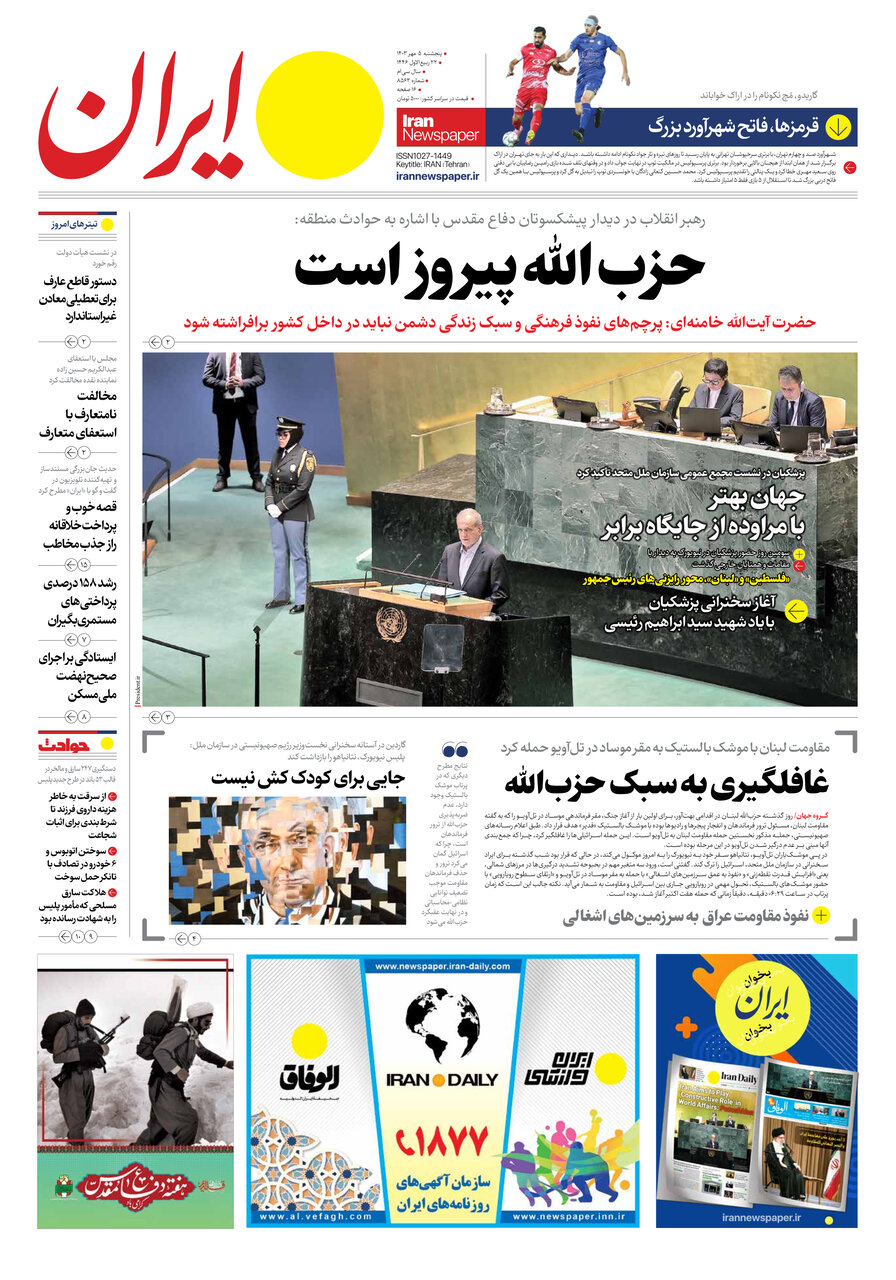Iran overcomes challenges with authority

TEHRAN - In an analysis, the Iran newspaper discussed the importance of President Masoud Pezeshkian's speech at the UN General Assembly.
It said: One of the very important points that Pezeshkian included in his speech at the UN General Assembly was that he started his address by reminding the late president martyr Raisi. By reminding this, Masoud Pezeshkian explained to the world that the Islamic Republic has the authority, strength, stability, and legal mechanisms that can overcome a bitter and great incident such as the martyrdom of its president and foreign minister with the least challenges. The transfer of power between the two figures with different political tendencies is a part of the inclusive nature of a political system called the Islamic Republic of Iran. In this way, it can be said that Pezeshkian, by reminding the world of this issue, talked about the dynamics, aliveness, and movement of political processes in Iran. Processes are sometimes referred to under the name of martyr Raisi or Masoud Pezeshkian, but they originate from a single nation.
Arman-e-Melli: Hope for the JCPOA team to break the deadlock
In a note, Arman-e-Melli examined Iran's diplomatic efforts in the United States and wrote: The efforts of the president to advance the talks to lift the sanctions are continuing. It seems that Westerners have taken the efforts of the new government in Iran seriously for negotiations to lift the sanctions. It seems the most important negotiation by the Iranian team in New York was the one between the President of Iran and the President of France. One of the most important discussions between the presidents of Iran and France was the Iran nuclear issue. Since the Europeans have been reluctant to negotiate about the nuclear issue, the solution to nuclear challenges has not progressed well. Of course, Iran has always complained about England, France, and Germany as bad members of the JCPOA. Nevertheless, the war in Ukraine cast a shadow on the issue and caused the Europeans to deal with the Iran nuclear issue with obstinacy. Despite all these differences, the meeting between the President of Iran and the President of France should be considered an important step because there is good news about it.
Ham Mihan: Lebanon should not become a second Gaza
In a commentary, Ham Mihan discussed the crisis in the region and the war between Israel and Lebanon's Hezbollah. It wrote: These days, on the eve of the anniversary of the war in Gaza, as well as the escalation of the conflict between Israel and Lebanon's Hezbollah, ambiguous and challenging conditions have been created, especially for Iran. Although Iran is Israel's enemy, there is a need to determine the limits of tension to control it. First of all, the policy of avoiding direct conflict with Israel should continue. This policy is not cost-free, but it is certainly better than entering into a state of war where the damage is uncontrollable. On the other hand, Iran should go towards persuading Hezbollah to end the conflict with Israel to deprive Israel of the excuse to continue the war against Lebanon. Iran's responsible policy should be to support its national security as well as protect its allies, including Hezbollah and the entire Lebanon. Lebanon should not be allowed to become a second Gaza. The initiative should be taken before the conflict get out of control. Courage is not in reckless and thoughtless actions. Rather it is to take tough and rational decisions to prevent further harm.
Jam-e-Jam: JCPOA negotiations and its psychological dimensions
Repeating the JCPOA issue several times shows a passion that can bring irreparable consequences for the country in the international arena. This type of attitude leads the Western calculation system to believe that Iran is in a more difficult economic, commercial, political, and even military condition than what was imagined. If Joe Biden's government officials continue to pretend to be indifferent to this demand in the final months of their authority, they will accomplish several goals. First, they adopt a strategy of silence and indifference to the demands of the Iranian side, and in the next stage set preconditions for the start of negotiations with the Iranian side. A position of weakness can lead to gaining concessions beyond imagination from Iranian negotiators. "Not showing eagerness to negotiate" is one of the basic and obvious principles of negotiation at the international level, and acting, on the contrary, shows that the rival party is weak and incapable, and this makes the dimensions of economic and political pressure narrower.
Leave a Comment